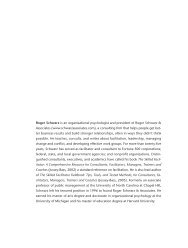The Skilled Facilitator Approach - Roger Schwarz
The Skilled Facilitator Approach - Roger Schwarz
The Skilled Facilitator Approach - Roger Schwarz
Create successful ePaper yourself
Turn your PDF publications into a flip-book with our unique Google optimized e-Paper software.
30<br />
Schön, 1974). This is called the unilateral control model. (I have adapted the unilateral<br />
control model from the work of Argyris and Schön, 1974, who developed<br />
the model and called it Model I, and from Robert Putnam, Diana McLain Smith,<br />
and Phil McArthur at Action Design who adapted Model I and refer to this as the<br />
unilateral control model.) You think of yourself as knowing all we need to know<br />
about the situation while thinking others who disagree are uninformed, you think<br />
of yourself as being right and others as being wrong, and you think of yourself as<br />
having pure motives while others’ motives are questionable.<br />
It is not possible to create collaborative relationships if you are thinking this<br />
way. Consequently, this thinking leads you to act in ways that create the very results<br />
you are trying hard to avoid: misunderstanding, increasing conflict, defensive<br />
reactions, and the strained relationships and lack of learning that accompany the<br />
results. To make matters worse, you are usually unaware of how your thinking leads<br />
you to act ineffectively. Rather, if you are like most other people, you typically<br />
attribute the cause of these difficult conversations to how others are thinking and<br />
acting.<br />
<strong>The</strong> same problem that reduces your effectiveness as a facilitator reduces the effectiveness<br />
of the groups you are seeking to help. Like the facilitator, the group<br />
members are also unaware of how they create these problems for themselves.<br />
<strong>The</strong> <strong>Skilled</strong> <strong>Facilitator</strong> approach helps you understand the conditions under<br />
which you act ineffectively and understand how your own thinking leads you to<br />
act ineffectively in ways that you are normally unaware of. It provides tools for<br />
increasing your effectiveness, particularly in situations you find emotionally difficult.<br />
This involves changing not only your techniques, but also how you think<br />
about or frame situations and the core values that underlie your approach. This<br />
shift to the mutual learning model means thinking that you have some information<br />
and others have other information, that others may see things you miss and<br />
vice versa, that differences are opportunities for learning rather than for proving<br />
others wrong, and that people are trying to act with integrity given their situation.<br />
(I have adapted the mutual learning model from the work of Argyris and Schön,<br />
1974, who developed the model and called it Model II, and from Robert Putnam,<br />
Diana McLain Smith, and Phil McArthur at Action Design who adapted Model II<br />
and refer to this as the mutual learning model.) This shift in thinking makes it<br />
possible to use the ground rules appropriately for effective groups and reduce the<br />
unintended consequences that stem from the unilateral control model. Making<br />
this shift is difficult but rewarding work, and it is essential for creating authentic<br />
<strong>The</strong> IAF Handbook of Group Facilitation



